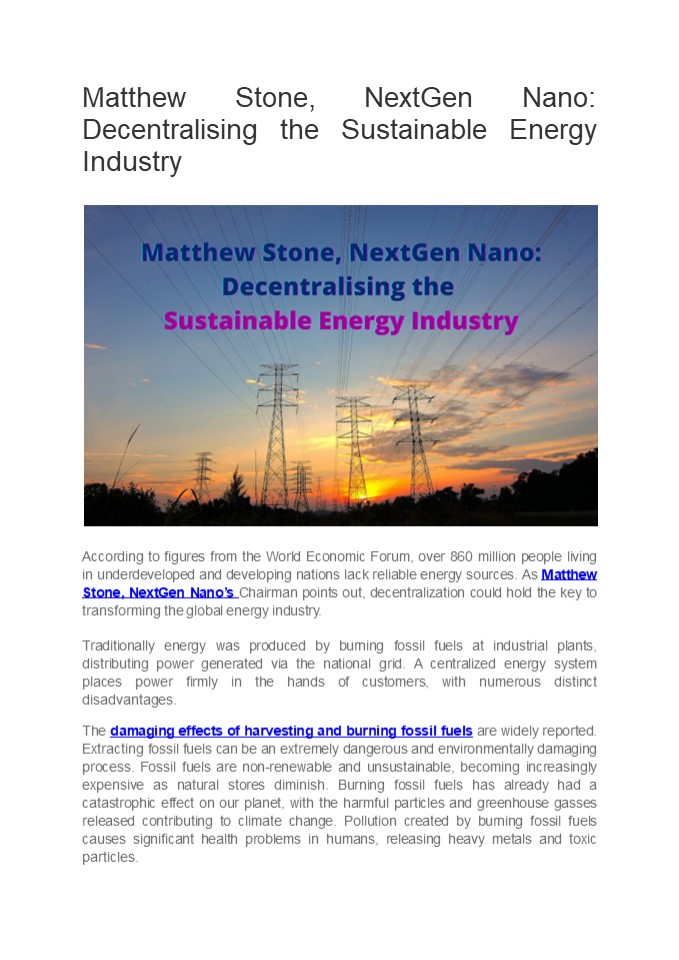Matthew Stone, NextGen Nano: Decentralising the Sustainable Energy Industry - PowerPoint PPT Presentation
Title:
Matthew Stone, NextGen Nano: Decentralising the Sustainable Energy Industry
Description:
Matthew Stone, NextGen Nano: Decentralising the Sustainable Energy Industry – PowerPoint PPT presentation
Number of Views:0
Title: Matthew Stone, NextGen Nano: Decentralising the Sustainable Energy Industry
1
Matthew Stone, NextGen Nano
Decentralising the Sustainable Energy
Industry
According to figures from the World Economic
Forum, over 860 million people living in
underdeveloped and developing nations lack
reliable energy sources. As Matthew Stone,
NextGen Nanos Chairman points out,
decentralization could hold the key to
transforming the global energy industry. Traditio
nally energy was produced by burning fossil fuels
at industrial plants, distributing power
generated via the national grid. A centralized
energy system places power firmly in the hands
of customers, with numerous distinct
disadvantages. The damaging effects of harvesting
and burning fossil fuels are widely reported.
Extracting fossil fuels can be an extremely
dangerous and environmentally damaging process.
Fossil fuels are non-renewable and unsustainable,
becoming increasingly expensive as natural
stores diminish. Burning fossil fuels has already
had a catastrophic effect on our planet, with
the harmful particles and greenhouse gasses
released contributing to climate change.
Pollution created by burning fossil fuels causes
significant health problems in humans, releasing
heavy metals and toxic particles.
2
At a traditional power station, energy is
generated continuously, irrespective of peaks
and troughs in demand. This makes traditional
power production far less effective and more
polluting. Centralized energy systems are also
susceptible to unexpected power failures, making
them less reliable.
Decentralized energy relies on small-scale
power-generating operations sited close to where
that energy will be used. Decentralized systems
largely rely on renewable sources rather than
fossil fuels, significantly decreasing the
environmental impact of energy production and
reducing reliance on finite resources. Decentrali
zation marks a major stepping-stone on the path
to independently sourced energy, decreasing
reliance on imported resources. A decentralized
system shifts power from energy companies to
small businesses and consumers, leveraging a
shared economy to create a more circular energy
system. Under a decentralized regime, energy
could be generated on a much smaller localized
scale, for example via wind or solar farms.
Recent advancements in organic photovoltaic
(OPV) technology accomplished by industry pioneer
NextGen Nano have paved the way for rapid
decentralization, aiding the transition to
sustainable energy. Guided by a management team
that includes Director of Operations Duncan
Clark, NextGen Nano has developed PolyPower, a
groundbreaking technology that generates record
OPV efficiency, presenting a new generation of
flexible, low-profile,
3
and transparent OPVs suitable for a variety of
applications, opening up new markets such as
electric vehicles, drones and planes, and the
internet of things. This Content is Taken
From https//ecolonomics.org/matthew-stone-nextge
n-nano-decentralising-the-sustainable-
energy-industry/






























